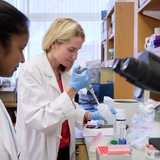Biliary Atresia Clinical Care Program

Most children with biliary atresia appear healthy at birth, but within weeks, their bile ducts – the tubes that remove bile from the liver – become blocked and prevent bile and waste from leaving the body. Biliary atresia can be serious, even life-threatening, if not treated quickly.
At the Children's Hospital of Philadelphia (CHOP) Biliary Atresia Clinical Care Program, we are committed to providing the best possible care for children with biliary atresia from infancy through young adulthood. We have a long history of caring for these children. The first successful treatment – the Kasai operation – was developed by a CHOP doctor. Since then, thousands of procedures have been performed – delaying or preventing the need for liver transplants.
How we serve you
We offer a variety of specialized programs and clinical services to children with biliary atresia and their families.

Meet your team
At CHOP, experts have been caring for children with biliary atresia since the 1970s. Today, our team remains dedicated to providing your child with state-of-the-art care.

Our research
Physicians and scientists from the Fred and Suzanne Biesecker Pediatric Liver Center – and programs for diseases like biliary atresia – continue researching the causes of liver disease and new ways to treat these disorders.

Biliary atresia resources
From support groups to websites, we’ve gathered resources to help you find answers to your questions about biliary atresia and feel confident with the care your child is receiving at CHOP.
Your donation changes lives
A gift of any size helps us make life-saving breakthroughs for children everywhere.


